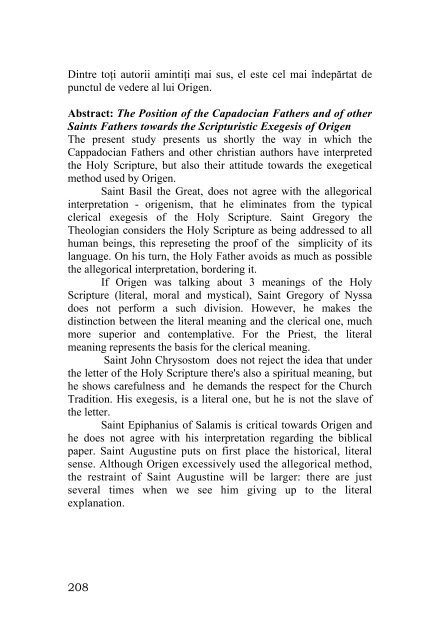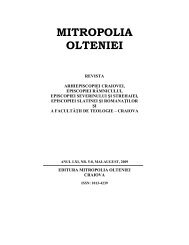- Page 1 and 2:
M OLTENIEI REVISTA TROPOLIA ARHIEPI
- Page 3 and 4:
CUPRINS STUDII Î.P.S. Acad. Prof.
- Page 5 and 6:
Ortodocşi şi greco-catolici în T
- Page 7 and 8:
PhD Assistent MIHAI CIUREA The Sens
- Page 9 and 10:
STUDII ESSENCE ET PERSONNES DANS LA
- Page 11 and 12:
grâce aux activités de Dieu et ay
- Page 13 and 14:
Dieu, il attribue l'élément commu
- Page 15 and 16:
séparent de la signification colle
- Page 17 and 18:
Basile prend comme exemple la perso
- Page 19 and 20:
arrivé au sommet de sa pensée, il
- Page 21 and 22:
de n'être contenu par aucun lieu,
- Page 23 and 24:
hypostase. Même si les anciens n'y
- Page 25 and 26:
n'ont pas dit ici que substance et
- Page 27 and 28:
Rezumat: Natură şi Persoane în S
- Page 29 and 30:
suplicii groaznice a „unui număr
- Page 31 and 32:
de măsuri concrete pentru a indemn
- Page 33 and 34:
adică, cu alte cuvinte, de a fi un
- Page 35 and 36:
faptul că el este cel care, în an
- Page 37 and 38:
vremii, Biserica ortodoxă, ecumeni
- Page 39 and 40:
(catolice) în relaţiile cu putere
- Page 41 and 42:
divina)...”. 40 Papa Ghelasie î
- Page 43 and 44:
would remain known in history under
- Page 45 and 46:
de la Connaissance blotties dans le
- Page 47 and 48:
salvatrice, située à la limite en
- Page 49 and 50:
eligieuses entre l’Occident et l
- Page 51 and 52:
Hans Jonas à considérer l’image
- Page 53 and 54:
la condition humaine - il observe q
- Page 55 and 56:
impuissante et sans relation normat
- Page 57 and 58:
quel est son principe directeur et
- Page 59 and 60:
în studiul nostru am încercat să
- Page 61 and 62:
în relaţie directă cu Maica Domn
- Page 63 and 64:
Evdochia, soţia lui Teodosie, în
- Page 65 and 66:
acestei realizări de prestigiu din
- Page 67 and 68:
celor din Occident. Faimoasa „leg
- Page 69 and 70:
detrimentul surorii acestuia. 21 As
- Page 71 and 72:
mai ales unul care le întrecea pe
- Page 73 and 74:
exemple ale relaţiei speciale care
- Page 75 and 76:
nu e doar un gest de corectitudine
- Page 77 and 78:
hotărârile sinodului tâlhăresc
- Page 79 and 80:
ortodox şi aşezate în biserici s
- Page 81 and 82:
IDENTITATEA LOCULUI NAUFRAGIULUI CO
- Page 83 and 84:
însă, trebuie să ne ducă la con
- Page 85 and 86:
Iulius. 12 Acesta avea îndatorirea
- Page 87 and 88:
coboare pe un cabotor, care va face
- Page 89 and 90:
când au plecat spre Roma. 39 Aceas
- Page 91 and 92:
nord-est, dar dacă ar fi aşa, „
- Page 93 and 94:
Presupunerea că aceştia erau deja
- Page 95 and 96:
„Căpetenia” acestei insule se
- Page 97 and 98:
astăzi, iar „de-a lungul Mării
- Page 99 and 100:
2, 4 cu coloniştii punici. 95 Aces
- Page 101 and 102:
În Malta, situl cel mai mult asoci
- Page 103 and 104:
Jacob Bryant susţinea cazul Meleda
- Page 105 and 106:
Lesbos şi Limnos, care este şi î
- Page 107 and 108:
perioada romană, desemna exclusiv
- Page 109 and 110:
evenimentelor. Astfel că cititorul
- Page 111 and 112:
VIZIUNEA UNITĂŢII SOBORNICEŞTI,
- Page 113 and 114:
Acelaşi autor înşiruie şi eleme
- Page 115 and 116:
Hristos se poate vorbi numai în ce
- Page 117 and 118:
Biserica una nu este doar o nota ec
- Page 119 and 120:
expansiune şi transfigurare a sufl
- Page 121 and 122:
mărturie curajoasă a creştinilor
- Page 123 and 124:
Una dintre cele mai de seamă contr
- Page 125 and 126:
ASPECTE CANONICE PRIVIND UNELE CONS
- Page 127 and 128:
afara colegiului Apostolilor, încr
- Page 129 and 130:
şi în cea Romano-Catolică, aceas
- Page 131 and 132:
perspectivă de abordare a fenomenu
- Page 133 and 134:
Trupul şi Sângele Domnului. Calea
- Page 135 and 136:
Cunosc ei oare sensul Altarului? Ş
- Page 137 and 138:
pe bărbat, ci să stea liniştită
- Page 139 and 140:
Din cele arătate mai sus putem con
- Page 141 and 142:
O SCURTĂ PRIVIRE ASUPRA BISERICILO
- Page 143 and 144:
austriacului Johann Weiss pentru a
- Page 145 and 146:
cu potcap şi camilafcă. 19 Pictur
- Page 147 and 148:
Rău, care în scurta domnie, a pus
- Page 149 and 150:
fost puse de domnitorul Pătraşcu
- Page 151 and 152:
probabil pe vremea preotului Vlad,
- Page 153 and 154:
iblioteca aşezământului la sfâr
- Page 155 and 156:
Paraschevi, depuse într-o raclă d
- Page 157 and 158: logofătul Ion Zugravu. 99 Reţinem
- Page 159 and 160: scăpând atât de pustiirea turcea
- Page 161 and 162: locuri şi cu mile domneşti pentru
- Page 163 and 164: într-o capelă, din incinta şcoli
- Page 165 and 166: enoriaşilor, în frunte cu preotul
- Page 167 and 168: împodobind-o cu picturi şi multe
- Page 169 and 170: cartierul Nord a fost înălţată
- Page 171 and 172: care dau grandoare spaţiului desti
- Page 173 and 174: firma Itaca, dirijată de Voinea Io
- Page 175 and 176: 15. Între anii 1996-2001, în cart
- Page 177 and 178: „mahala”. 196 Numărul lor îns
- Page 179 and 180: SENSUL SUFERINŢEI ŞI AL RUGĂCIUN
- Page 181 and 182: Plecând de la acestea, autorul în
- Page 183 and 184: Sfântului Iacob se potriveşte cu
- Page 185 and 186: (Marcu 6, 12-13). Însă untdelemnu
- Page 187 and 188: nu este pentru moarte, ca în catol
- Page 189 and 190: vindecarea de o suferinţă sau de
- Page 191 and 192: ATITUDINEA PĂRINŢILOR CAPADOCIENI
- Page 193 and 194: mesajul primit. Aghiograful devine
- Page 195 and 196: 2. Sfântul Grigorie Teologul Aseme
- Page 197 and 198: al scrierii cărţilor biblice şi
- Page 199 and 200: Scriptură trebuie să fie înţele
- Page 201 and 202: ând, îndeamnă la citirea prealab
- Page 203 and 204: sfinte nu pot fi pătrunse de minte
- Page 205 and 206: Cartea Psalmilor a avut o contribu
- Page 207: nu respectă Legea Domnului. Şi î
- Page 211 and 212: unde marile mănăstiri fuseseră
- Page 213 and 214: Pe faţa estică a tâmplei de zid,
- Page 215 and 216: Domnului se constituie ca o evocare
- Page 217 and 218: caracteriza prin programe care vari
- Page 219 and 220: 49, 9) împreună cu Cei trei tiner
- Page 221 and 222: (ps. 148, 4) - al căror ciclu hagi
- Page 223 and 224: Un rol important l-au avut aceste a
- Page 225 and 226: Demetrescu, ucenici ai lui Anton Pa
- Page 227 and 228: în poezia „La Râmnic”, unica
- Page 229 and 230: n-aibă niciodată/ Strâmtorare de
- Page 231 and 232: în această călătorie, Anton Pan
- Page 233 and 234: manuscrise la biblioteca mănăstir
- Page 235 and 236: datorită incendiului care a distru
- Page 237 and 238: apropierea oraşului Râmnicu Vâlc
- Page 239 and 240: isericeşti realizată de Gheorghe
- Page 241 and 242: cel mai important manuscris al său
- Page 243 and 244: activitatea pe mai multe planuri: d
- Page 245 and 246: muncă asiduă şi susţinută. Era
- Page 247 and 248: antologiei porneşte de la crezul p
- Page 249 and 250: Abstract: The Psalt Musicians in Ol
- Page 251 and 252: viaţa cea dumnezeiască. a Născă
- Page 253 and 254: Cântarea 6. Rugăciunea mea voi v
- Page 255 and 256: de trei ori fericite, Grigorie de D
- Page 257 and 258: cuviinţă şi dragoste nefăţarni
- Page 259 and 260:
Atunci Zaharia a zis către înger:
- Page 261 and 262:
mai doresc femeile astăzi să aib
- Page 263 and 264:
în gândire acesta a devenit un or
- Page 265 and 266:
Ierarh Calinic de la Cernica în Mi
- Page 267 and 268:
ostrovul Sfântul Gheorghe. În anu
- Page 269 and 270:
podoabă aleasă a Sfintei noastre
- Page 271 and 272:
şi Mitropolitul Ardealului, şi pe
- Page 273 and 274:
Române. După amiază, începând
- Page 275 and 276:
tămăduitoare de boli trupeşti, p
- Page 277 and 278:
strămoşeşti”. În după-amiaza
- Page 279 and 280:
Giurgiului, PS Sebastian, Episcopul
- Page 281 and 282:
S-a oficiat apoi, începând cu ore
- Page 283 and 284:
„Sfântul Mare Mucenic Gheorghe
- Page 285 and 286:
pe credincioşii prezenţi. În ami
- Page 287 and 288:
tot cuvântul care iese din gura lu
- Page 289 and 290:
acestei săptămâni am trăit mome
- Page 291 and 292:
duhovniceşti „de peste timp”,
- Page 293 and 294:
Sfântul Sinod al Bisericii Ortodox
- Page 295 and 296:
de către credincioşi, urmată de
- Page 297 and 298:
SF. GRIGORIE DE NYSSA, Împotriva l
- Page 299 and 300:
postulează un monoteism de factur
- Page 301 and 302:
Demonstraţia amplă a Sf. Grigorie
- Page 303:
REDACŢIA ŞI ADMINISTRAŢIA Facult




